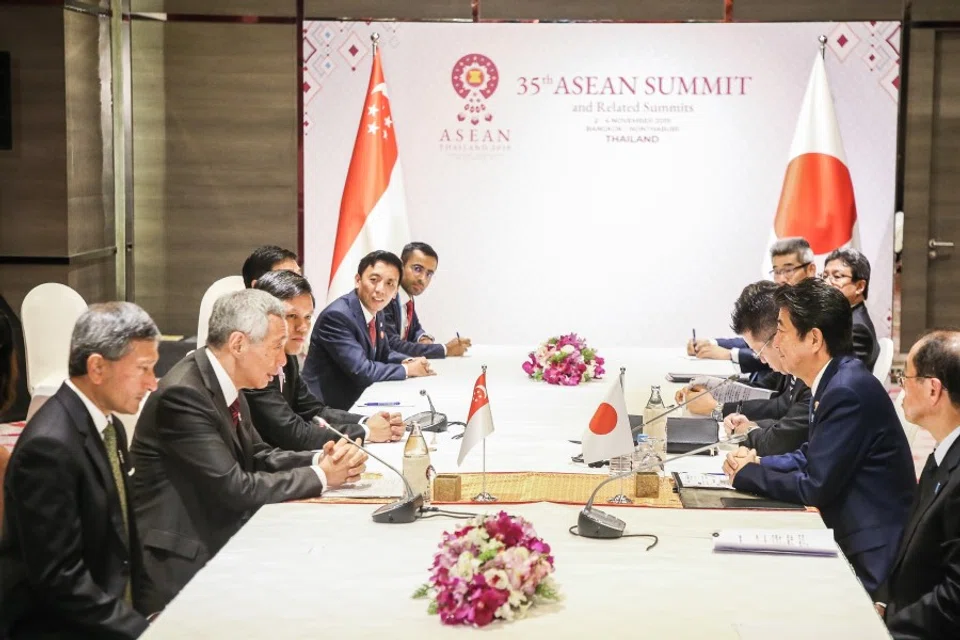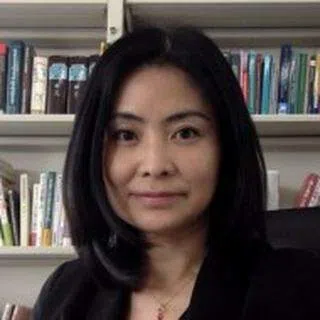Post-Abe: Japan-ASEAN partnership crucial in navigating great power rivalry
With Shinzō Abe's imminent departure from office, Japanese academic Mie Oba looks back at Japan-ASEAN diplomacy under his charge, and at the expansion of defence cooperation between Japan and certain Southeast Asian countries. She says Japanese partnership with ASEAN has become more important, as Japan and ASEAN continue to navigate the escalating rivalry between China and the US in the Indo-Pacific region.

Shinzo Abe was inaugurated as prime minister at the end of 2012, beginning the second Abe administration. Since then, the strategic partnership between Japan and the ASEAN countries has continued to deepen in the approximately eight years until Abe expressed his intention to resign for health reasons some days ago.
Partly due to the timing, with 2013 marking the 40th Anniversary of ASEAN-Japan Dialogue Relations and the substantive start of the Abe administration, the Abe administration established a foreign policy emphasising ASEAN. During the first two years of the administration, Abe and then Foreign Minister Fumio Kishida visited all ten ASEAN countries and pitched its emphasis on ASEAN to the public. Even before the Abe administration, there had been moves to deepen and expand the cooperative Japan-ASEAN relations to include security cooperation. The diplomacy of Abe and Kishida, symbolised by their trips to ASEAN countries, was an extension of this.
However, for Japan, cooperation with the ASEAN countries has become more important than ever before, as the political presence of China continues to expand and it has become more active in ASEAN diplomacy under the Xi Jinping administration. At the same time, the importance of cooperating with the ASEAN countries on security issues has further increased, and this has brought about changes in the essential nature of relations between Japan and the ASEAN countries.
Japan and some ASEAN countries such as the Philippines, Vietnam, Malaysia and Indonesia promoted the expansion of defence cooperation between them.

One example of these changes being expressed was the Vientiane Vision: Japan's Defense Cooperation Initiative with ASEAN announced by then Defence Minister Tomomi Inada at the second ASEAN-Japan Defence Ministers' Informal Meeting held in Vientiane in Laos in November 2016. This vision advocated the promotion of cooperation to improve the defence capabilities of the individual ASEAN countries and of ASEAN as a whole. The vision included the specific measures of transferring defence equipment and technologies, as well as the cultivation of human resources.
This move to strengthen support for ASEAN countries' improvement of their law enforcement capabilities on the sea also contained an aspect of restraining China, which has actively advanced into the waters of the South China Sea.
Both before and after the announcement, Japan and some ASEAN countries such as the Philippines, Vietnam, Malaysia and Indonesia promoted the expansion of defence cooperation between them. For example, an Agreement on the Transfer of Defense Equipment and Technology was signed with the Philippines in February 2016, and then a similar agreement was signed with Malaysia in April 2018. Japan donated 10 patrol boats, 13 high-speed boats and TC-90 training aircraft to the Philippine Coast Guard. In addition, secondhand ships and maritime security-related equipment were donated to Vietnam in 2014 and 2015. Abe and Prime Minister Nguyen Xuan Phuc also agreed on Japan's offer of six new patrol boats at their meeting in January 2017, with both countries officially signing an agreement in June of that year.
Also in 2017, Japan donated two of its Ojika-class patrol boats, one of the world's largest, to Malaysia. This move to strengthen support for ASEAN countries' improvement of their law enforcement capabilities on the sea also contained an aspect of restraining China, which has actively advanced into the waters of the South China Sea. To put it more broadly, it can be positioned as a specific measure highlighting the Abe administration's stance of contributing to the stability of maritime order in East Asia and the Indo-Pacific, including the South China Sea region under the policy of "Proactive Contribution to Peace".
On the other hand, the Free and Open Indo-Pacific (FOIP) vision stirred doubts about the earnestness of the Abe administration's emphasis on ASEAN countries. In Abe's speech, in which he substantively advocated this vision in Nairobi in 2016, and in subsequent Japanese government materials fleshing out the vision, there was no mention of the positioning of ASEAN countries. ASEAN countries criticised the Japanese government for downgrading them and expressed concerns that they would be unable to agree with a vision forcing them to confront China, due to their close economic relations and China's increasing political influence over them.
Responding to these criticisms and concerns, the Japanese government hastily added clear references to ASEAN in a document explaining the FOIP vision. However, as Japan itself gradually came to demonstrate its own cooperation with China, the FOIP's tone weakened regarding the restraining of China. On the other hand, ASEAN countries compiled the ASEAN Outlook on the Indo-Pacific (AOIP), ASEAN's own vision for the Indo-Pacific, and it was not significantly different from the direction of the FOIP.
...during the COVID-19 pandemic, China has moved to expand its influence over the ASEAN countries by mixing hard- and soft-line policies, symbolised by the carrot of mask diplomacy and the stick of strengthening its effective control over the South China Sea.

Nevertheless, particularly after the Trump administration strengthened its hardline attitudes toward China, US-China relations have significantly worsened, and Japan and Southeast Asian countries have been struggling to identify how to maintain distance from both the US and China while being sandwiched between them. In addition, during the Covid-19 pandemic, China has moved to expand its influence over the ASEAN countries by mixing hard- and soft-line policies, symbolised by the carrot of "mask diplomacy" and the stick of strengthening its effective control over the South China Sea.
Economic relations between China and the ASEAN countries have been further strengthened, as indicated by statistics showing an increase in the volume of trade between China and ASEAN during the height of the crisis, in addition to the upward trend of China's investment in Southeast Asia over the last several years.
Japan has been forced to come into alignment to some extent with the United States FOIP that much more strongly expresses the need to restrain China.
On the other hand, Vietnam, the Philippines and Indonesia strongly resent the blatant actions of China in the South China Sea. While the US fell behind in its cooperation with ASEAN countries in dealing with Covid-19, the country has made clear its goal of changing its past position through operations to display its presence in Asia through Freedom of Navigation Operations, and actions taken by Secretary of State Mike Pompeo in July 2020 to deny China's claims in the South China Sea and to take the side of those ASEAN countries whose territories conflict with China's claims.
Japan has been forced to come into alignment to some extent with the US FOIP that much more strongly expresses the need to restrain China. In the middle and end of August 2020, the US Navy hosted the 27th Rim of the Pacific Exercise (RIMPAC), with Japan, Australia and some ASEAN countries such as Brunei, the Philippines and Vietnam participating.
In this situation where the conflict between the US and China is escalating, ASEAN and Japan are sharing the issue of what sort of relationships they will establish with the two superpowers. In addition, affected by the decline of Japan's relative position in East Asia, relations between Japan and the ASEAN countries are transforming from the simple vertical structure they took on in the past - with Japan standing on the side supporting the ASEAN countries who received that support. Meanwhile, the idea of the nations as "an equal partner" as described in the Fukuda Doctrine in 1977 is, in fact, coming into existence. Further coordination and cooperation between Japan and ASEAN have become essential to ensure the stability of the region. In light of these facts, the government succeeding the Abe administration should further strengthen relations with ASEAN and promote substantive and effective cooperation.





![[Photos] Fact versus fiction: The portrayal of WWII anti-Japanese martyrs in Taiwan](https://cassette.sphdigital.com.sg/image/thinkchina/3494f8bd481870f7c65b881fd21a3fd733f573f23232376e39c532a2c7593cbc)